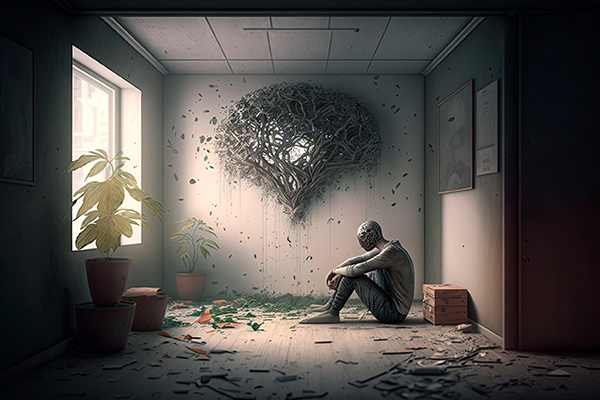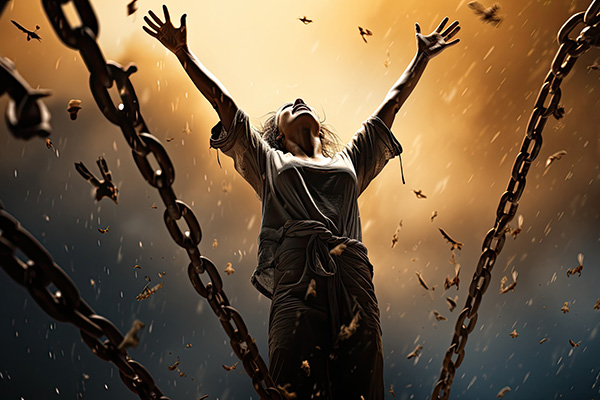childhood trauma
How To ‘Face Everything And Rise’ (F.E.A.R.)
 It’s okay to feel afraid sometimes – some fear responses are a natural and vital part of our built-in self-protection system. Rooted in our primal survival instincts, fear helps us identify and respond to real threats, such as a raging fire or a dangerous wild animal.
It’s okay to feel afraid sometimes – some fear responses are a natural and vital part of our built-in self-protection system. Rooted in our primal survival instincts, fear helps us identify and respond to real threats, such as a raging fire or a dangerous wild animal.
Survival fear arises in response to immediate, tangible threats to our safety or well-being. It’s a necessary, life-preserving mechanism based on objective, real-world risks that ensure our survival. By activating the body’s fight-or-flight response, it enables us to act quickly and stay safe.
But not all fears are instinctual, nor do they serve our highest good. Irrational fears arise from societal conditioning, cultural expectations, false beliefs, past traumas, or imagined scenarios. These fears are learned or imagined, not instinctual.
Unlike survival fear, irrational fears reflect internalized doubts, imaginery threats and false narratives that serve no protective function at all. Instead, they just interfere with our personal growth, decision-making, and well-being.
Conditioned fears are typically exaggerated or irrational, existing more in the mind than in reality. Examples include fear of failure, fear of rejection, or fear of not living up to social standards. Self-limiting fears can trap us in cycles of self-doubt and hesitation, limiting our ability to take risks, grow, and live wholeheartedly.
To live our best lives, we must learn to recognize these irrational fears, challenge their validity, and prevent them from taking control of our life and well-being. By stepping back and evaluating the source of our fears, we can release what no longer serves us, reclaim our joy, and unlock our full potential.
New Year, New Habits, And A New You!
 Many people make resolutions every year that are never kept. They make a sincere effort for a month or so, and then it just slips here and there until whatever they decided to do just falls by the wayside. This is normal, and you should never beat yourself up if you make a resolution or promise and don’t follow through. Growth is a process, not a straight line.
Many people make resolutions every year that are never kept. They make a sincere effort for a month or so, and then it just slips here and there until whatever they decided to do just falls by the wayside. This is normal, and you should never beat yourself up if you make a resolution or promise and don’t follow through. Growth is a process, not a straight line.
When I decide to do something, the first thing I do is meditate on it. I ask my guides and angels, “Is this right for me? Will this improve my life? If I don’t do this, will it hurt me or someone else? If the answers are yes, yes, and no, then I know it’s the right thing for me to do.
I do not reserve this for New Year’s resolutions. I do this throughout the year whenever I feel spiritual growth within myself or experience something that sparks change, whether positive or negative. A new year can begin any day you decide to change some aspect of your life. It doesn’t have to be January 1st; it can be any day.
Personally, I make a new “resolution” each month. At the end of each month, I reflect and ask myself if I’ve accomplished what I set out to do. If not, I set it aside and move on to something new. Eventually, I return to the unfulfilled goal, knowing that the timing wasn’t right. I don’t beat myself up about unfinished goals; instead, I send them love and leave them for later.
My most important resolution is to get closer to Spirit. I strive to understand what Spirit has in store for me and to guide me to become the best version of myself from the inside out. The outward appearance can be dressed up or down, but the true self must be healed, clear, and joyful. That joy doesn’t come from another person or thing – it comes from loving myself as it should be for you. Love yourself as you are in this moment, and nurture the new version of yourself with daily love, meditation, and surrender to your higher self.
Karmic Healing: Can You Handle The Truth?
 In the famous courtroom drama A Few Good Men, Jack Nicholson’s character, Colonel Jessup, exclaims in an iconic movie moment, “You can’t handle the truth!”
In the famous courtroom drama A Few Good Men, Jack Nicholson’s character, Colonel Jessup, exclaims in an iconic movie moment, “You can’t handle the truth!”
I suspect this scene has become legendary in movie history because it resonates so deeply with most people. On some level, many of us sometimes struggle to face the truth about ourselves and our lives.
Whether it’s difficult memories, unhealed wounds, failed relationships, or unspoken regrets, facing our truth can be challenging, even traumatic or overwhelming.
Yet, from a spiritual perspective, facing and owning our truth is one of the most powerful steps we can take on our path to karmic healing and soul growth.
Our soul journey is a karmic balancing act in which the energy we put out into the world eventually comes back to us. When we hide from our truth – whether through denial, justification or avoidance – we accumulate karmic debt.
Like a heavy boulder that we carrry around, karmic debt hinders our soul growth and spiritual progress. On the other hand, when we consciously choose to face our truth, we release this burden and open ourselves to healing, growth, fulfillment and inner peace.
Denial is our most common response to unpleasant truths. We tend to avoid acknowledging aspects of ourselves that we find unattractive, justify our negative behaviors, and make excuses for our bad choices and failures in order to protect our fragile human egos. However, these “untruths” build up over time. By avoiding them, we create layers of illusion that distance us from who we really are and cloud our understanding of our soul purpose and the divine spark within.
Unstuck Your Life By Transmuting Your Origin Story
 Do you feel that no matter what you do, your life experiences seem to be stuck on repeat? Are you living the same scenario over and over with a different cast of characters? Or maybe even the same cast, but going through the same problems over and over with no change? If any of this sounds familiar, you may need to revise your origin story.
Do you feel that no matter what you do, your life experiences seem to be stuck on repeat? Are you living the same scenario over and over with a different cast of characters? Or maybe even the same cast, but going through the same problems over and over with no change? If any of this sounds familiar, you may need to revise your origin story.
We all have an origin story. It is a set of deeply held ideas and beliefs that shapes how we see ourselves and our place in the world. It is the story of that we constantly repeat when we talk about ourselves or think about our life experiences. Internally, we use it to define ourselves, and externally, we use it to present ourselves to others.
Our story of origin comes from family, early life experiences, and the choices we made about ourselves as we grew up. While it helps define us, it can also become a prison, limiting our growth and repeating unsatisfying patterns in what we manifest.
In my work as a psychic consultant, I often find in readings that many people are held back by their origin story without even realizing it. When we hold on too tightly to our chosen narrative, we become trapped in cycles that prevent us from evolving into the version of ourselves we truly want and deserve to be.
An origin story differs from a limiting belief in that it is more about the construction of our identity and personality – who we are and how we want to be in the world. It can be more difficult to identify and deconstruct because it is such a strong part of our personal identity. However, it is similar to limiting beliefs in that it is important to explore and become aware of it because it can hold us back and create very unsatisfying life experiences.
How To Embrace Your Shadow Self
 Most people tend to shy away from acknowledging their dark or “shadow” side when it comes to spirituality.
Most people tend to shy away from acknowledging their dark or “shadow” side when it comes to spirituality.
In fact, the tendency to avoid the uncomfortable aspects of the self is due in large part to our religious or spiritual background. Throughout history, most traditions have encouraged people to suppress, deny, or transcend their human flaws and shortcomings in favor of higher ideals such as purity, salvation, or enlightenment.
This reluctance to face the shadow within continues to this day, with modern spiritual and metaphysical communities often favoring light, love, and positivity while largely ignoring the messy, difficult, and painful aspects of the human experience.
But by avoiding the shadow within, we deny ourselves the opportunity for a deeper understanding of our soul’s purpose and untapped possibilities for personal and spiritual growth.
According to Carl Jung, the famous Swiss psychiatrist who pioneered the concept of the “shadow” in psychology, “one is not enlightened by imagining figures of light, but by making the darkness conscious.” Enlightenment isn’t about avoiding the shadow. Instead, it’s about facing it and integrating it into our being.
When we face the shadow within, we reclaim parts of ourselves that hold immense power, creativity, and insight. By delving into the deeper truths of our shadow selves, we can unravel the unconscious patterns that dictate our lives, allowing for true healing, transformation, and enlightenment.
The Spiritual Power Of Choosing To Forgive
 Forgiveness is a much-discussed topic in spiritual circles. It is also often deeply misunderstood.
Forgiveness is a much-discussed topic in spiritual circles. It is also often deeply misunderstood.
Forgiveness does not mean condoning wrongdoing or accepting abuse or cruelty. Instead, it involves choosing not to carry the darkness and negativity that has been inflicted upon you, and refusing to allow it to affect your well-being, either physically or emotionally.
While it’s ideal to find compassion for those who have wronged you, it’s not always possible. Understand that those who caused you harm are often suffering themselves.
Happy and fulfilled people are naturally kind, generous, and honest. In contrast, those consumed by self-loathing and misery tend to spread chaos and cruelty. Their relationships are full of conflict and dissatisfaction.
I once worked with a man who was clearly struggling with mental illness. Circumstances placed us in a business relationship that I initially tried to avoid, preferring to distance myself from unhealthy situations. However, I was compelled to help him because I was told that my true role was to support his children and providing help where it was needed most.
This unfortunate man is consumed by rage from his own traumatic past-abuse by his mother, mistreatment by her successive husbands, and conflict with his first ex-wife. His life is a testament to the destructive power of unresolved anger and lack of forgiveness. His toxic energy is rooted in past hurts and a cycle of inflicting pain on others.
Become A Magnet For Joy And Happiness
 Have you ever experienced such an intense level of joy after receiving wonderful news or a successful outcome that not even the most negative person could dampen your mood or ruin your day?
Have you ever experienced such an intense level of joy after receiving wonderful news or a successful outcome that not even the most negative person could dampen your mood or ruin your day?
Well, that’s the kind of energy you need to send out into the universe if you want to become a magnet for love, happiness and fulfillment.
Many people are constantly stuck in a cycle of negativity. They see the worst in every situation and project their pessimism onto everyone and everything around them.
As a psychic counselor, I’ve worked with many clients over the years who have fallen victim to the negativity of such naysayers and energy thieves – people who try to drag others down to their level to alleviate their own discomfort.
In these scenarios, I then guide my clients on how to better protect themselves energetically and maintain balance spiritually, mentally, emotionally, and in the worst cases, even physically.
They do this by creating an invisible shield that deflects the negativity. This shield sends the negative energy right back at the ‘happiness trolls,’ neutralizing their psychic attacks and preventing their pessimistic, toxic energy from affecting you.
Your life will take a major turn for the better when you realize that some people are not even aware of how their negativity affects others. Often these people have had very difficult lives or traumatic childhoods filled with anger and conflict. They are often carriers of serious levels of unresolved karmic debt, which they typically make no effort to address due to their lack of self-awareness and spiritual awareness. You cannot expect someone to break free of these karmic patterns and ancestral legacies if they are not aware that they even exist.